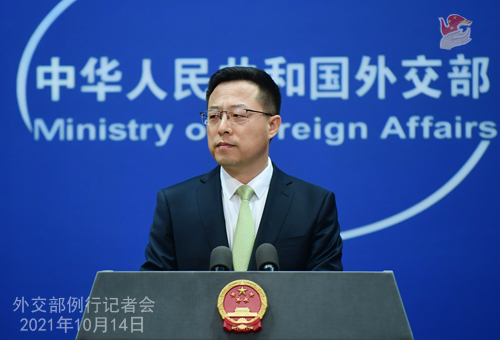
CRI: The Kunming Declaration was adopted on October 13 at the 15th meeting of the Conference of the Parties to the Convention on Biological Diversity (COP15) to call on all parties to take actions to build a shared future for all life on Earth. Can you give us more details?
Zhao Lijian: On October 13, the high-level segment of COP15 concluded in Kunming, Yunnan province, where the Kunming Declaration was adopted, calling on all parties to take actions to build a shared future for all life on Earth.
As a political declaration, the main purpose of the Kunming Declaration is to reflect the political will of all parties, send a strong signal, and show to the world the determination and actions of all parties to solve the problem of biodiversity loss. The release of the Kunming Declaration will help advance biodiversity protection, reverse the current trend of biodiversity loss and realize the 2050 vision of "living in harmony with Nature".
At the COP15 leaders' summit, President Xi Jinping announced China's initiative to establish a Kunming Biodiversity Fund and take the lead by investing 1.5 billion RMB yuan to support biodiversity protection in developing countries. We are ready to take this as an opportunity and a new starting point to join hands with other parties to protect biodiversity, tackle climate change and protect the planet we call home.
China Review News: Pentagon Press Secretary John F. Kirby told journalists on Tuesday that "the PRC has stepped up efforts to intimidate and pressure Taiwan and other allies and partners; including increasing their military activities, conducted in the vicinity of Taiwan, the East China Sea and the South China Sea; which we believe are destabilizing and only increase the risk of miscalculation." What is China's comment?
Zhao Lijian: Taiwan is China's Taiwan. The US is in no position to make irresponsible remarks. Relevant steps taken by China are legitimate and reasonable measures to safeguard its sovereignty, security, territorial integrity and rights and interests. With joint efforts of China and other neighbouring countries around the South China Sea, the situation in the South China Sea is generally stable at present. The remarks on the US side are in grave violation of the one-China principle and the stipulations of the three China-US joint communiques. The US' deliberate attempt to drive a wedge between China and regional countries with the relevant issues has sent out an extremely erroneous and irresponsible message. China deplores and firmly opposes this.
For some time, the US has been making negative moves by selling arms to Taiwan and strengthening its official and military ties with Taiwan, including the launch of a $750 million arms sale plan to Taiwan, the landing of US military aircraft in Taiwan and frequent sailing of US warships across the Taiwan Strait. The US has been stirring up trouble, flexing muscles in the South China Sea and China's neighboring areas and stoking geopolitical confrontation. This has fully revealed that the US is a troublemaker, a saboteur of regional peace and stability, and a spoiler of solidarity and cooperation.
The US side should take China's position and concerns seriously, earnestly abide by the one-China principle and the stipulations of the three China-US joint communiques, and stop making irresponsible remarks on Taiwan and maritime issues.
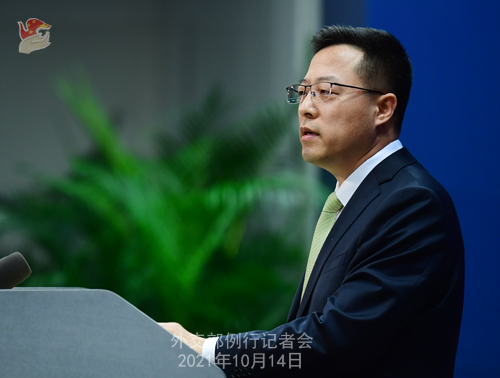
AFP: The World Health Organization yesterday named a new scientific group to study the origins of COVID-19 and viruses with the potential to spark epidemics and pandemics in the future. Does China have any response to that? If they want to conduct investigations here in China, will China agree to that?
Zhao Lijian: The Chinese side noted the World Health Organization announced on its website proposed members of the WHO Scientific Advisory Group for the Origins of Novel Pathogens (SAGO), including Yang Yungui, the Deputy Director at the Beijing Institute of Genomics at the Chinese Academy of Sciences in China.
China always maintains that origins-tracing is a serious and complex scientific issue, which should be undertaken by scientists around the world through joint research. Since the outbreak of COVID-19, China has taken the lead in conducting joint research with the WHO and invited WHO experts to China twice for field visits, which have yielded important and positive results and laid a good foundation for global scientific cooperation on origins-tracing. China will continue to support and participate in global scientific origins-tracing and firmly oppose any form of political manipulation. We hope that all parties concerned, including the WHO Secretariat and SAGO will adopt an objective, scientific and responsible attitude, follow the requirements and relevant mandates of the WHA resolution, take the first phase of joint study as the basis, adhere to a global perspective, perform their duties in an objective and fair manner, and truly make a positive contribution to global origins-tracing and anti-epidemic cooperation.
Hubei Media Group: In his article titled Climate justice: The real story published on October 11, Professor Kishore Mahbubani, a renowned scholar in Singapore, acknowledged China's climate actions and contributions and refuted some politicians' wrong views of putting the responsibility to address climate change on developing countries like China and India. He said that China has been enhancing its commitments and taking concrete actions in contrast to the US' withdrawal from agreements. Do you have any comment?
Zhao Lijian: That's very well-put indeed! Professor Kishore Mahbubani is making a very good point because he tells the truth. For example, he said that the largest emitter in cumulative terms is the US.
Climate change is the result of cumulative emissions of greenhouse gases. Developed countries have unshirkable and historical responsibility since they have been releasing greenhouse gases into the atmosphere for the past 200 years or so of industrialization. The US' cumulative historical emissions per capita are eight times that of China. The US has seriously undermined the confidence in and effectiveness of global cooperation on climate change by refusing to ratify the Kyoto Protocol and withdrawing from the Paris Agreement. For many countries, there is still a big question mark about whether US climate policy will change or even backpedal again. At present, the challenge of climate change is becoming increasingly serious which underlines the urgency of international cooperation. Developed countries should earnestly follow the principle of common but differentiated responsibilities, face squarely their historical responsibilities, demonstrate greater ambition and actions, and take the lead in fulfilling emission reduction obligations. Meanwhile, they should provide financial, technological and capacity building support to help developing countries enhance their capacity to respond to climate challenges.
China has been contributing to global climate governance, leading efforts in ecological protection, and taking actions to implement the Paris Agreement. It will take 71 years for the EU, 43 years for the US and 37 years for Japan, all of which are developed countries, to achieve carbon neutrality from carbon peak. However, China has set itself a time limit of only 30 years. The time taken by the EU, the US and Japan is 2.4 times, 1.4 times and 1.2 times that of China respectively. China, the largest developing country, will move from carbon peak to carbon neutrality in the shortest time, which demonstrates China's sense of responsibility as a major country. Besides, China recently announced that it will step up support for other developing countries in developing green and low-carbon energy, and will not build new coal-fired power projects abroad. This is another major measure to address climate change and positive contribution to global green recovery. Looking ahead, China will continue to take the initiative in taking bolder climate actions and make even greater contributions to the global fight against climate change.
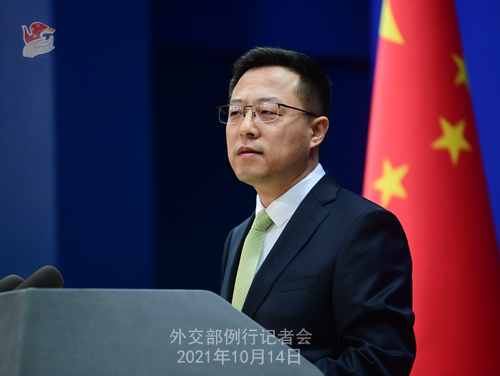
CCTV: Vice-President of the International Olympic Committee (IOC) John Coates said on October 13 that the IOC will not pressure 2022 Winter Olympics host China over its human rights record because it is not in the governing body's remit to dictate to sovereign countries. It is pointless for any country to boycott the Beijing Winter Olympics. Do you have any comment?
Zhao Lijian: We appreciate his remarks. The Beijing Winter Olympics will be held in February, 2022. Guided by the principles of hosting "green, inclusive, open and clean" events, China has carried out all preparatory work with high standards and high quality. Important progress has been made in stadium and infrastructure construction. The event organization and service have been carried out in an orderly manner. The successful opening of the test events will lay a more solid foundation for the Beijing Winter Olympics and Paralympics.
The Beijing Winter Olympics and Paralympics are a grand gathering for countries and a fair stage for athletes from all over the world to compete. Beijing will be the first city in the world to host both the Summer and Winter Olympic Games. This is an important contribution China will make to the International Olympic movement. Winter sports lovers around the world are looking forward to the Beijing 2022 Winter Olympic Games.
China is ready to work with the rest of the international community to oppose the politicization of sports, demonstrate the new Olympic spirit of being "together", render each other help and assistance in times of need, and work hand-in-hand "Together for a Shared Future".
China is fully confident to deliver a simple, safe and splendid Olympic Games to the world. Athletes from all countries will feel welcome here in China, where they can show the splendor of winter sports on ice and snow.
Macau Monthly: Russian President Vladimir Putin said in an interview on October 13, local time that the establishment of any blocs, including AUKUS, undermines regional stability because "it is good to be friends but to be friends against anyone is bad". Do you have any comment?
Zhao Lijian: As we have pointed out on many occasions, the AUKUS nuclear submarine cooperation creates serious nuclear proliferation risks, and clearly violates the spirit of the Treaty on Non-Proliferation of Nuclear Weapons (NPT). It will not only have a far-reaching impact on the international non-proliferation system, but also bring real threats to regional peace and stability. First, it could create nuclear proliferation risks and impact the international non-proliferation system. Second, it could trigger a new round of arms race, as other countries could follow suit and even cross the nuclear threshold. Third, it could undermine regional prosperity and stability and create regional tensions. Fourth, it could undercut ASEAN countries' efforts to build a Nuclear-Weapon-Free Zone (NWFZ) in Southeast Asia. Fifth, it could lead to the resurgence of the Cold War mentality, provoke bloc confrontation and zero-sum geopolitical games in the region.
Anyone with discerning eyes can easily see that the AUKUS trilateral security partnership is similar to the Quad mechanism in that they both are subordinate to and serve the US-led "Indo-Pacific strategy". the US repeatedly claims to be a champion of "freedom and openness", but in fact it is acting to create small cliques and military blocs in the region. Such moves run counter to the trend of the times and garner no support, and will only cause alarm and rejection among regional countries and the international community.
CNR: Robert Malley, US Special Envoy for Iran, said on October 13 that the United States is ready to consider "all options" to address the Iranian nuclear issue and has talked to China about sanctions on Iran. Can you confirm and share your comments on this?
Zhao Lijian: China always believes that resuming the full and effective implementation of the JCPOA is the only effective way to resolve the Iranian nuclear issue. Facts have proven time and again that sanctions and pressure lead nowhere, and dialogue and consultation is the right way forward. Iran has repeatedly reaffirmed its commitment to the JCPOA and its readiness to return to negotiations on the resumption of compliance. Relevant parties should respond to Iran's reasonable demands by taking concrete actions, push for an early resumption of negotiations and strive for new progress.
I would like to stress once again that as the one who caused the renewed tension on the Iranian nuclear issue, the US should correct its wrong policy of "maximum pressure" on Iran, lift all illegal sanctions against Iran and measures of "long-arm jurisdiction" over a third party, refrain from imposing new Iran-related sanctions and bring the JCPOA back on track at an early date. The US is well aware of China's position of opposing sanctions and China's determination to firmly uphold its legitimate interests.
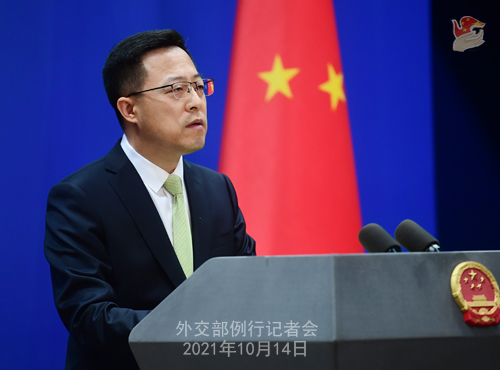
The Global Times: According to NHK reports, when Japan's new industry minister Koichi Hagiuda visited the Fukushima Daiichi nuclear power plant, officials of the prefecture told him the local people are gravely concerned about the handling of the nuclear contaminated waste water, saying that the scandals of TEPCO have undercut the public's trust and calling on the central government to take seriously their concerns. Do you have any response to that?
Zhao Lijian: This report once again shows that the people are clear-eyed. It is not only the Pacific Rim countries that oppose and are concerned about the discharge into the sea of nuclear-contaminated water from Fukushima. The local people in Japan, especially in Fukushima, also have serious concerns, and their legitimate demands should be taken seriously and addressed. Moreover, TEPCO cannot even gain the trust of the Japanese people. Can it be trusted by the international community for the data it provided on nuclear-contaminated water and the safety promises it makes?
Japan's decision to discharge nuclear-contaminated water into the sea is not a private matter of Japan alone. Instead, it concerns the global marine environment and the health and wellbeing of people in neighboring countries. We hope that the new Japanese government will listen carefully to the call of the international community and the Japanese people, reverse the wrong decision of the previous government. It must not take the liberty of starting the discharge of nuclear-contaminated water into the sea before having full consultation and reaching agreement with relevant stakeholders and international agencies.
FSN: Reports say that China is preparing to test 200,000 blood samples, including those that were gathered in the final months of 2019, which is pinpointed as a possible key source of information on the origins of COVID-19. Will China share that data with the WHO or even invite members of the WHO scientists to conduct testing together with China?
Zhao Lijian: I also noticed relevant reports. Please refer to competent authorities of China for your specific question. As I understand, the Law of the People's Republic of China on Blood Donation and measures for the administration of blood centers have detailed regulations of the storage and usage of blood samples.
Kyodo News: The Japanese government officially dissolved the lower house of parliament today, setting the stage for the election on October 31. Is China following the development? What do you expect from the new parliament?
Zhao Lijian: You are talking about Japan's internal affairs, which is not something China would like to comment.
Bloomberg: The US and the Philippines are planning to return to full-scale military drills in 2022 after two years, and will invite Australia and the UK as observers, which is sort of another sign of the Biden administration's push to deepen ties in the Indo-Pacific and counter China's assertiveness moving forward. Do you have any response to this?
Zhao Lijian: China's position on the issue concerned is consistent and clear-cut. China does not oppose military drills by relevant countries, but hopes that they do not target third parties. We hope relevant measures can contribute to regional peace and stability, instead of the opposite.
The Paper: On October 13, Russian President Vladimir Putin spoke highly of his deep friendship with President Xi Jinping and the outcomes of China-Russia practical cooperation in the Q&A session of the plenary session of Russian Energy Week international forum. What is China's comment?
Zhao Lijian: We have noted the reports and highly appreciate the positive statement of President Putin.
The guidance of the heads of state provides the fundamental guarantee for the development and vigor of China-Russia relations. The deep friendship between President Xi Jinping and President Putin is built on a high degree of mutual trust. We firmly believe that no matter how the international situation may evolve, China-Russia relations will stay the right course and achieve steady and sustained development under the leadership of the two heads of state.
Practical cooperation is an integral part of China-Russia relations, and an important guarantee for development and revitalization of the two countries. As the world faces flare-ups in the pandemic and sluggish international trade and investment, practical cooperation between China and Russia keeps pressing ahead with the bilateral trade volume staying above the hundred-billion-dollar mark and expected to hit a record high this year. Major strategic projects in energy and other traditional sectors were launched smoothly, and cooperation in scientific innovation, e-commerce and other emerging sectors maintains a strong momentum, with the outcomes broadly benefiting the two societies and peoples. China highly appreciates this. Going forward, China is ready to work with Russia to broaden and deepen bilateral cooperation and cement the foundation for the development of China-Russia relations in a new era.
Bloomberg: We understand that India and China had disagreements during their 13th round of military talks over their border issue, with China being reluctant to engage with India's requests. What exactly are the sticking points in those discussions?
Zhao Lijian: I briefed you in detail about the relevant situation the other day. I have no more information to share with you.
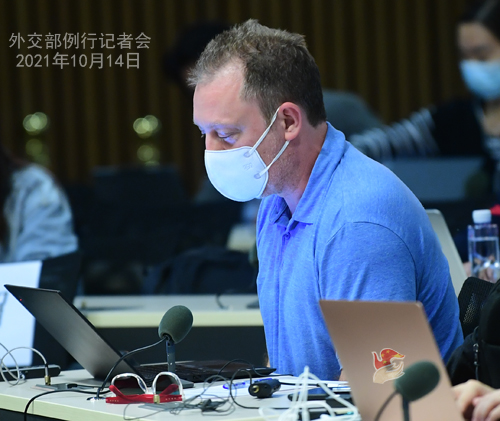
***
The Event of MFA Presenting Tibet to the World will be held online and offline at 16:00 on Wednesday, October 20, 2021, at Lanting, South Building of the Ministry of Foreign Affairs of the People's Republic of China. With the theme of "China on a New Journey: A New Chapter of Development for a Happy New Tibet", the event is co-organized by the Ministry of Foreign Affairs and the People's Government of Tibet Autonomous Region. State Councilor and Foreign Minister Wang Yi will be present and address the audience. Wu Yingjie, Secretary of the CPC Tibet Autonomous Regional Committee, and Yan Jinhai, Acting Chairman of the People's Government of Tibet Autonomous Region, will deliver remarks and presentations respectively. Friends from at home and abroad as well as representatives from the Diplomatic Corps will deliver remarks.
The event will give a comprehensive review of all-round progress, historic achievement and the Party's Tibet policy in the new era over the past 70 years under the leadership of the Communist Party of China (CPC). It will demonstrate the resolve, ambition and aspiration of people of all ethnic groups in Tibet to form a new development paradigm, and build a modern socialist new Tibet that is united, prosperous, culturally advanced, harmonious and beautiful under the leadership of the CPC. You are welcome to cover the event.